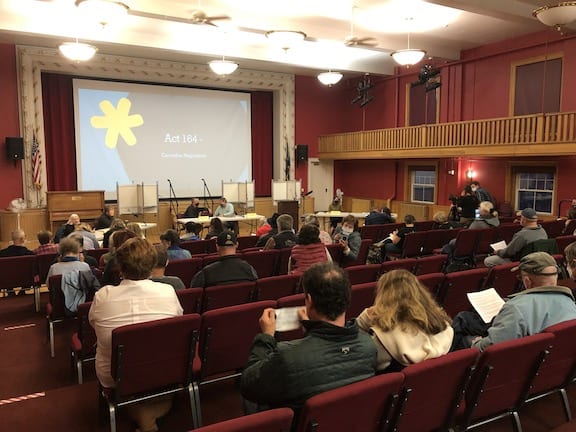
LUDLOW, Vt. – Ludlow’s special informational meeting to discuss the future of adult cannabis retail sale in town drew a large crowd of approximately 80 people Monday, Nov. 1, in anticipation of the vote on whether Ludlow should opt-in to allow sales of cannabis. At the polls on Tuesday, the vote on whether to allow retail cannabis in Ludlow was defeated by a margin of 17 votes.
Allison Hopkins, senior planner at Mount Ascutney Planning Commission, opened the informational meeting with a short presentation outlining Act 164, cannabis regulation for Vermont. Hopkins was clear that regional planning was neither advocating for nor against whether a town opted in or out, but provided broad facts such as the issues being decided by Vermont’s Cannabis Control Board and the timing for roll out in the state.
Final statewide procedures for adult cannabis sales will be adopted by March 2022, and licenses will be issued in October of 2022 to towns that have voted to opt in.
Hopkins also outlined some next steps once a town decides to opt-in to allow cannabis sales such as establishing a local cannabis control board to establish local licensing fees, determine how many licenses will be allowed, look at existing signage, and create goals and policies related to cannabis sales, including establishing local safeguards.
Moderator George Thomson, who later praised participants for being very respectful, led the group through a well-organized process, allowing everyone who wished to speak a five-minute window. Once everyone had spoken once, a second two-minute timeframe was then allowed. Participants were reminded from the beginning that this was not a forum to debate the pros and cons of cannabis itself, but to discuss the merits or disadvantages of allowing sales in town.
Overall, the crowd spoke in support of approving cannabis sales in Ludlow. Of the 11 participants who asked to speak, seven were in favor of cannabis sales with four against. The level of applause for spoken remarks also seemed to show greater support of the measure.
Residents who spoke against the measure cited concerns that Ludlow would be attracting unwanted additional traffic, would be taking away from Ludlow’s family-friendly atmosphere, and were doubtful they would see any significant tax revenue from cannabis sales – that it would largely go to the state because Ludlow is classified as a “gold town.”
Pam O’Neil, president of Black River Area Community Coalition, spoke of BRACC’s mission to prevent substance use, including marijuana prevention. She expressed concern for cannabis being a gateway drug and felt local sales would take away from Ludlow’s family-friendly atmosphere. She also expressed concern that the vote was happening too fast.
Resident Dean Alexander said that Ludlow was a nice community, and he did not think Ludlow needed to be a destination for buying cannabis. Alan Couch suggested the benefits for the town were moot and would be minimal versus the negatives. He said Ludlow could have a nice, symbiotic relationship with a nearby town selling cannabis.
Of those in support of opting in to allow adult retail cannabis sales in Ludlow, many cited direct financial gains for the town, including income to the town through licenses and fees, increased year-round traffic, increased support for other Ludlow businesses, and increased jobs. Others talked about the benefits of having a secure place to purchase safe, legal cannabis with educated workers to help advise users for medicinal applications of cannabis. They also spoke about statistics in other parts of the country selling legal cannabis, that have not seen an increase in youth consumption, crime, or drug abuse or incremental expenses as many have feared.
Laura Bellantoni, a local business owner, who also owns a sister store in a Provincetown, Mass., location, said that cannabis stores near her Massachusetts location are super professional and promote additional traffic in town. She also countered Couch’s claim saying they did not need to send business or “love” to other towns.
Another business owner Charles Rimer said that 90% of people in Ludlow rely on people coming to town for their livelihood, and the town should be making money on cannabis, that it was no different from liquor sales.
Gene Jakominich, a cancer survivor who has used cannabis in the course of treatment, said it would be valuable to take advantage of this cash crop and didn’t want for this to be a missed opportunity for Ludlow.
Resident Sarah Edelman, who uses cannabis to treat anxiety, said that she has talked to many tourists who stop at a dispensary in Northampton, Mass., on their way to Ludlow. “They could spend their money here,” she said.
Andrea Goldman, who along with Meredith Milligan are the duo behind the legislation and hope to be a recipient of a license for cannabis sales in Ludlow, stressed the safety of legal cannabis versus elicit cannabis, which is prevalent in town regardless. She spoke of the extensive training and regulations required for a dispensary. She also said that the Vermont Cannabis Commission Control Board has just recommended that of the excise taxes, 1 to 2% go to the town, which she believes could reach $100,000.
Dr. Linda Thomson talked of the well-documented benefits of both CBD and THC in cannabis and those in medical community who are unable to prescribe cannabis due to federal restrictions. She said to have legalized cannabis in the community for those who have a medical need but can’t get a prescription, it would be a great thing if it were legally available and standardized.
On Tuesday, Nov. 2, the measure was defeated 162 “yes” to 179 “no” votes.